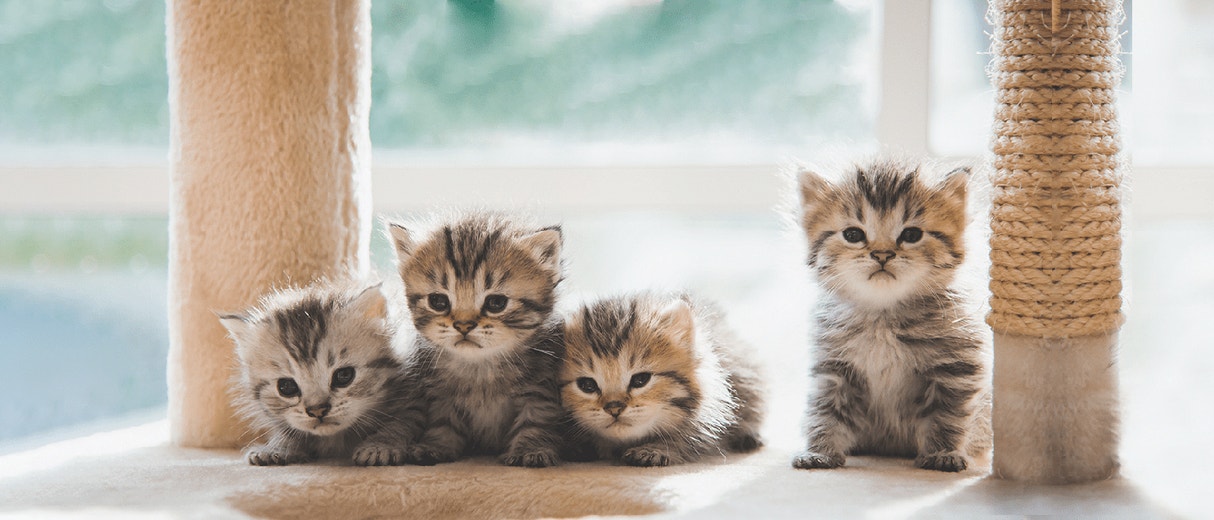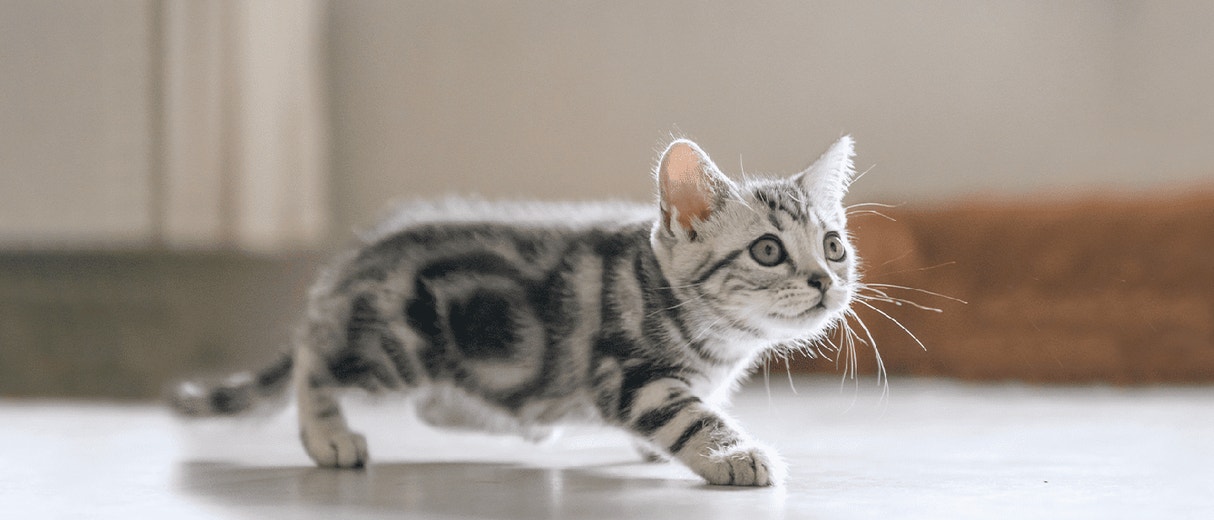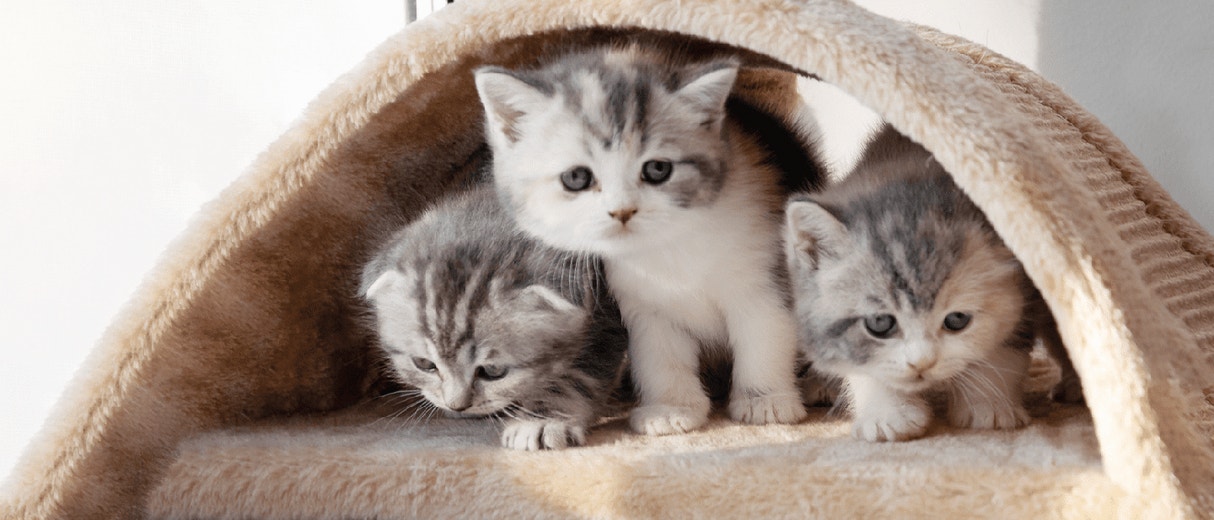
How to Care for a Kitten
As infants, kittens are vulnerable, and completely reliant on their human parents. This article helps you answer questions like how to feed kittens or how to care for a kitten or how do you bathe a kitten. Whether you have been fostering a litter or a single little feline furry munchkin, here are some ways you can care for your little furball, and learn about how to feed kittens.
First week
In the first week, make sure your furball has a comfortable nest with absorbent bedding and a source of warmth.
Second week
Kittens start opening their eyes for the first time in their second week, but still need a source of warmth, and must be introduced to deworming.
Third and fourth week
Kittens start to grow in their third week, and must be provided with a litter box to relieve themselves.
Fifth week
Your little furball might start teething, and is preparing itself to be introduced to solid food and water!
Sixth week and onwards
Kittens are now ready to take on the world, and are at their most energetic! Kittens must also be taken to the veterinarian for vaccination!
How to groom your kitten?
Having a kitten grow up in the household is a sight to behold, but it also comes with additional responsibilities like feeding and cleaning after them, and grooming themselves to perfection! So can I bathe my 1 month old kitten, and how do you bathe a kitten?
Bathing
When it comes to how do you bathe a kitten, you must keep in mind that kitten bathing can be challenging. However, kittens must be given a bath periodically to get rid of fleas, ticks and mites.
Feeding
Kittens start teething in their fifth week, and are finally ready to transition to solid food in smaller amounts!
Cleaning claws/nails
In addition to knowing how to bathe a kitten, trimming their claws and cleaning their paws is an essential part of cat grooming. Knowing how to bathe a kitten also makes it easier to clean their fur, ears, and teeth during kitten bathing.
Important Kitten Nutrition
Cats are obligate carnivores, and are largely dependent on animal protein and fats as their primary source of nutrition. So how to feed kittens?
Here are some of the important nutritional requirements for kittens:
Proteins
Kittens are dependent on protein as their primary food, as it contains the essential amino acids - lysine, arginine and methionine for their speedy development.
Choline and taurine
Taurine and choline are essential to kitten nutrition for maintaining good health.
Fat
Essential fatty acids such as omega-3 fatty acid DHA help in the rapid physical development and cognitive growth in kittens.
Vitamins and minerals
In addition to a regular intake of vitamins, kittens rely on minerals such as copper, magnesium and iodine.
Calcium and phosphorus
The rapid bone development in kittens requires an intake of calcium and phosphorus.
How to Select a High-Quality Kitten Food?
As infants, kittens derive all their nutrition from newborn kittens milk. However, growing up, kittens require a balanced diet that supplements them with all essential nutrients to support their speedy physical development.
So, it is important to choose high-quality kitten food prepared from fresh ingredients and zero added chemical preservatives. While home-cooked meals in low oil and spices are the best food for growing kittens, you can also look into high-quality canned cat food as an excellent alternative.
How Much Should I Feed My Kitten?
Although kittens in their first year require a higher caloric intake than adult cats to support their rapid physical and cognitive growth, it is important to know how to feed newborn kittens and make sure that they are not overfed. Instead, you can offer food to your furball more frequently in smaller portions.
Till they are six weeks of age, kittens use their mother's milk as the only source of nourishment and hydration. In the first couple of weeks, kittens should drink at least 6 to 12 ml of milk every 2 to 3 hours, which increases till they are at least 6 weeks of age. If the mother cat is unable to nurse her kitten, it is important to look into the kitten formula recommended by a veterinarian.
Once they have weaned and transitioned to solid food, kittens can be given smaller portions of commercially available cat food or home-cooked kitten food in smaller portions.
Wet Cat Food
In their period of physical growth and development, kittens not only require a high-calorie meal to support their rapidly changing bodies and energetic lifestyle, but also need sufficient moisture content in their food to be able to keep up with their everyday adventures.
So how to feed a newborn kitten and what to feed newborn kittens? Though cats are not always fond of drinking water, wet cat food is an excellent replacement that ensures your kitty receives all the necessary nutrients while staying hydrated throughout the day. If you prefer home-cooked meals for your little furball, adding some flavourful tuna juice or chicken broth can also go a long way in keeping them hydrated.
Dry Cat Food
Kittens over 6 weeks of age can also be safely introduced to dry cat food that is not just delicious, but is also rich in proteins, fatty acids, minerals, and vitamins. So, if you are wondering what to feed newborn kittens, kittens in their growing period require up to 1 cup of dry cat food to be well-nourished. Kittens over 8 months to 1 year of age can be given multiple portions of dry cat food throughout the day, and sufficient kitten sleeping schedules.

Daily Activities for Your Kitten
Now that you know how to feed a newborn kitten, a growing kitten does not just require adequate amounts of food, but as a responsible cat parent, it is also vital to make sure that your fuzzy furball receives sufficient physical exercise and cognitive stimulation.
So, when it comes to how to care for newborn kittens, it is important to look into various daily activities your kitty can be a part of while having fun. Additionally, these daily activities require cat parents to interact with their little fur baby, and helps in fostering a deeper loving bond.
- When it comes to how to care for a kitten, it is imperative to organise morning play sessions for their cognitive growth and development of hunting skills. It also helps you understand your kitten better and learn how to care for newborn kittens.
- Worried about how to take care of a kitten or how to feed a newborn kitten? Kittens must be given adequate amounts of food in frequent intervals as well as kitten sleeping schedules to make sure they are well-fed and energetic for an adventure-filled day!
- Kitten grooming is an important part of your tiny furball’s day. So, it is important to know how to bathe a kitten and when to bathe kittens.
- Other than knowing how to bathe a kitten and how do you take care of a stray kitten, you can also join your little furball for the playing sessions. Not only is it an excellent way of beating stress, but it also helps establish an affectionate relationship between you and your kitty, making it easier for you to know how to take care of a kitten.
FAQs
-
Which is the best pet to have with a cat?
Housecats are completely harmless and are generally accommodating to other animals, making it easier for cat parents to adopt other pets. Ferrets, dogs, tortoises, guinea pigs and rabbits are the best pets to have if you already own a cat.
Should we bring a cat or a dog first?
Dogs generally need longer time to be trained, so, if you are looking to get a dog, as well as a cat, it is important to bring home a middle-aged dog first and train it accordingly before getting a kitten.
Can you train a dog to live with a cat?
Considering how wild dogs prey on smaller animals, it is important to train a dog to live with a cat. Most dogs are open to training and can be taught how to treat smaller animals gently to live with cats.
How long does it take for cats to get along?
Cats are reserved and introverted, which takes them a longer period of time to befriend and get along with other cats. Although they are accommodating and affectionate, most cats take 3 to 4 months to get along with each other.
When is the time to seek professional help?
Introducing to a new pet can be stressful for cats, but they are accommodating and are quick to learn. However, if your cat is still stressed of the new pet after months, it might be time to seek professional help.




